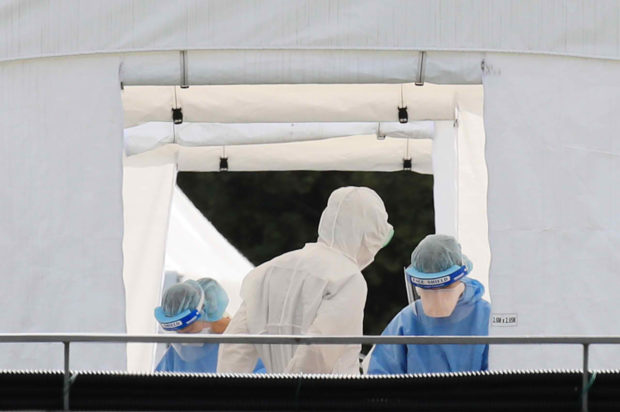SEOUL — South Korea’s new virus cases rose by the highest number in nine days Wednesday amid looming mass infections at a major hospital in Seoul and a rise in nightclub-linked cases.
An uptick in virus cases put health authorities on higher alert over further community spread as high school seniors began to return to schools following a monthslong school closure over the pandemic.
The country added 32 new coronavirus cases, raising the total caseload to 11,110, according to the Korea Centers for Disease Control and Prevention (KCDC). Of the new COVID-19 cases detected Tuesday, 24 were local infections.
The daily new infections mark the largest since May 11, when the number hit 35.
Concerns about yet another cluster of infections emerged, as four nurses working at Samsung Medical Center, one of the country’s five major general hospitals, were infected with COVID-19.
Health authorities said more related cases are likely to spring up, as transmission routes are unknown.
Contact tracing is being conducted to determine whether the source of infections originated in the hospital. A study is under way into 623 people who came into contact with the infected nurses.
Cases tied to clubs in Seoul’s nightlife district of Itaewon also continued to increase steadily. The total caseload linked to the Itaewon cluster reached 187 as of Tuesday.
Health authorities remain vigilant against further community spread at a time when more schools are set to reopen in the coming weeks.
The education ministry went ahead with phased school reopening as scheduled amid a letup in Itaewon-linked infections.
South Korea switched to an “everyday life quarantine” scheme on May 6 to enable citizens to carry out social and economic activities under quarantine rules.
The country, meanwhile, added eight imported cases and reported no additional deaths, with the total death toll staying at 263. The fatality rate was 2.37 percent.
The total number of people released from quarantine after full recoveries stood at 10,066, up 128 from the previous day.
The country, with a population of more than 50 million, has carried out 776,433 tests since Jan. 3, including 10,859 the previous day. Yonhap
